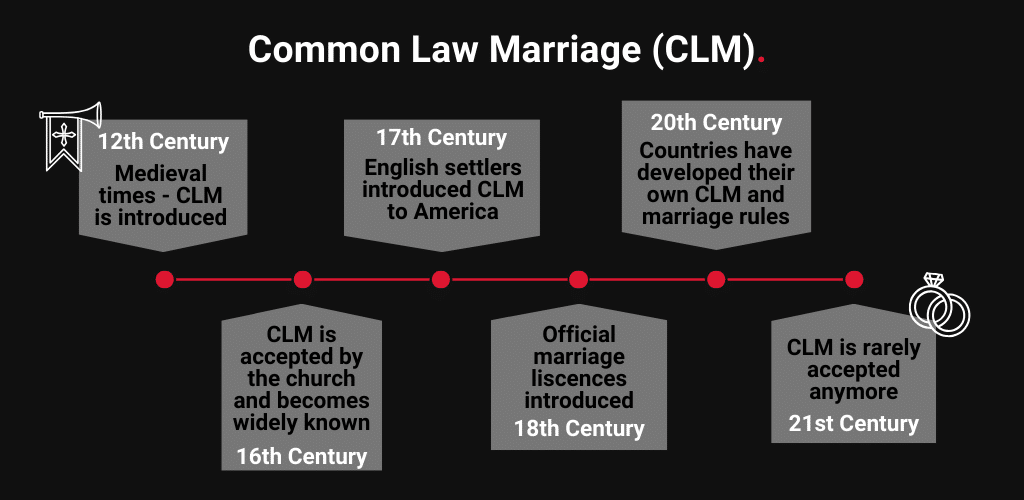In this article

Are unmarried couples living together (cohabiting) protected under common law marriage?
If you’re asking yourself that question, you’re probably wondering what your legal rights are as an unmarried couple.
In this blog, we explain what common law marriage is, whether it protects cohabiting couples, and what cohabiting couples can do to take care of their assets.
Looking to cut to the chase? If you’re looking for legal advice about cohabiting, just call us on 020 3007 5500, or submit a contact form.
What is common law marriage, and does it still exist?
Our expert team of family law solicitors are always asked what common law marriage is and whether it exists. We can only assume it’s the same for other law firms across the country!
Common law marriage dates back centuries but sadly is no longer applicable to modern-day times. These days, the only way to achieve a recognised marriage is to actually get married.
But what happened to common law marriage and why is it no longer in practice?

Talk to us now. Prepare for the future.
Prepare for all eventualities by getting your affairs in order now. Speak to us today for more information.
Lines open 24/7

The history behind common law marriages
Common law marriage is an arrangement dating back to medieval times.
Back then in rural England, marriage wasn’t a religious affair. It was enough that a man and a woman said they took each other as husband and wife for them to be married. It was as simple as that! Even the wider community and church recognised the arrangement as an official marriage.
At the time, England was also a Catholic country. It was under the sphere of influence of Pope Innocent III that the church set the requirement for marriage to take place in front of a priest.
This led to a tradition called ‘handfasting’ where couples exchanged legally binding vows and sometimes had their hands tied together with a knot as a symbol of their union. Coincidentally, this is where the term ‘tie the knot’ came from.
Over time, this evolved. First, in the 16th century with a requirement for 2 witnesses and a priest at the handfasting. Then with the introduction of marriage licenses at the end of the 17th century.
After multiple further reforms, we arrive at marriage law today – and the disappearance of common law marriages.
Does common law marriage apply anywhere else in the world?
Common law marriage made its way over to America by English settlers and in some states is still recognised. The recognition and rules of a common law marriage vary between countries and states, so always consider this when researching.
Is my relationship considered a common law marriage in England and Wales?
The short answer is no. It doesn’t matter how long you and your partner have been together, your cohabitation arrangement cannot be considered a marriage under common law because common law marriage is no longer applicable in England and Wales.
There are, however, certain rights afforded to cohabiting couples, or those who live together.
What are our rights as a cohabiting couple?
This is an important question that couples living together should consider carefully.
In England and Wales, couples living together aren’t covered under the same rights as married couples when it comes to separation or death. That means, for example, that if one of you were to win the lottery and pass away the next day, the other person could be entitled to nothing, even if you lived together for decades.
In fact, the only areas the law covers in terms of cohabitation are child arrangements and domestic abuse. In the case of the former, the Children’s Act will ensure the fair split of parental responsibilities and finances relating to the child.
Confused with your options as cohabitees?
Don’t worry, we’re here to give the advice you need when you need it. Just contact us to arrange an appointment.
Lines open 24/7
020 3007 5500
What can cohabiting couples do to protect their assets?
There are a few ways to cover you and your partner for the future.
Cohabitation agreements
A cohabitation agreement (aka a living together agreement) is a legal document that sets out the organisation of your assets, finances, and responsibilities as a couple.
In your cohabitation agreement, you’ll cover all aspects of your life together, such as:
- How you’ll split your bills
- Financial dealings and obligations
- Pet and child arrangements upon separation.
Each couple will have a cohabitation agreement tailored to them. Cohabitation agreements are more popular amongst couples with a history of divorce, or where there is a wealth disparity, but that’s not the only use for them.
If one or both of you have children from other relationships, a cohabitation agreement can set out practical financial roles and responsibilities in the event of a split.
Wills
Lots of people think that wills are only necessary when you get older, but this isn’t the case.
Wills can offer great financial security to cohabiting couples, regardless of age.
If you decide not to get married and one of you passes away, the surviving partner isn’t automatically entitled to anything. Instead, the distribution of assets will be in line with laws completely out of your control.
If you’re separated from a previous partner but not divorced, your entire estate could even go to your ex-spouse.
In your will, you can specify what you leave to your partner if you pass away, providing security and peace of mind for the future.
Pensions and life insurance
This is similar to wills, in the fact that your partner won’t receive anything automatically. You must speak with your providers and get your partner named on your accounts.
Although less common, you may wish to consider instructions to access tools such as e-wallets if you have cryptocurrency investments.
Marriage
If you’ve read this blog and feel like your options aren’t great or maybe you even feel they’re unfair, marriage might be the best option for you. But remember that tying the knot doesn’t come free of its own strings attached.
The law is much more stringent for married couples, setting grounds for divorce and death.
If you’re avoiding marriage because you can’t afford the expense, don’t forget you don’t have to spend a lot of money on a big wedding. You always have the option of a small ceremony at your local registry office, which costs on average around £1400.
Now that you know that as a cohabiting couple, you’re not covered under common law marriage, you can make an informed decision on how to protect yourself and your partner going forward.
With the rise of cohabitation, it seems a shame that the law has not yet aligned. It leaves many people in a disadvantaged position, especially upon separation or a partner passing away.
Industry professionals have called for the introduction of new laws surrounding cohabitation. But there has been no confirmation as yet. It’s definitely an area to keep an eye on in the future.
How can Britton and Time Solicitors help?
We understand that preparing legal documentation can feel daunting. That’s why our initial consultations with our boundary dispute solicitors offer you:
- Unlimited time to go through the details of your case and ask any questions you may have
- An overview of your legal standpoint and your available options
- A precise time and fee estimate for your case
To arrange your initial consultation with one of our solicitors, simply call us on 020 3007 5500.






0 Comments